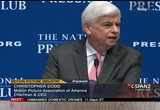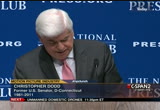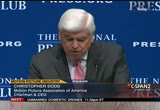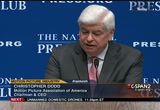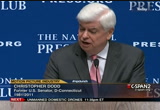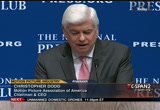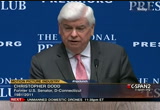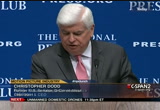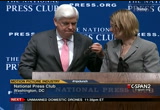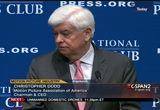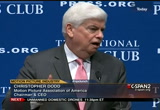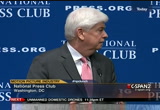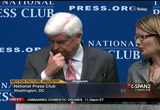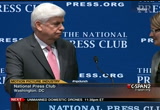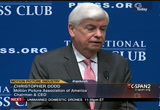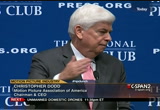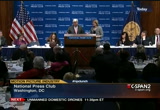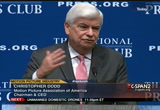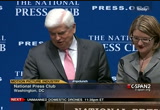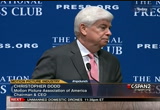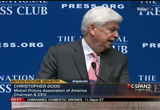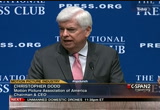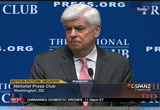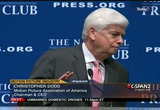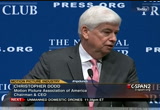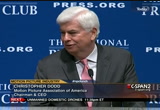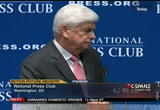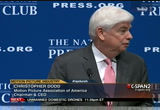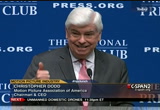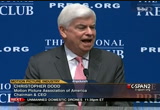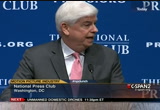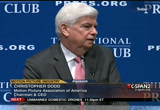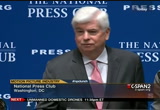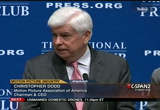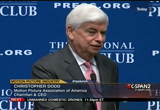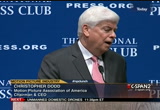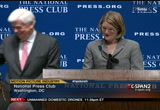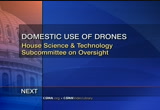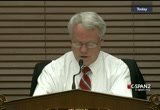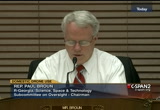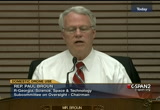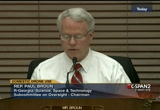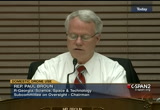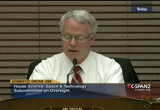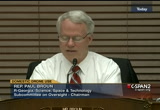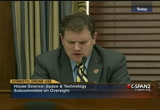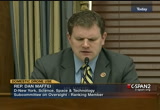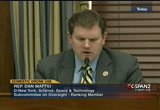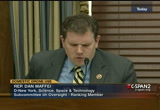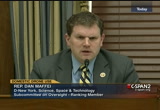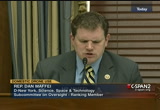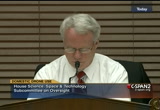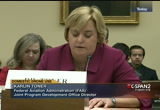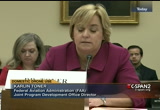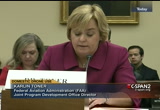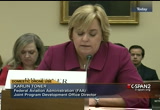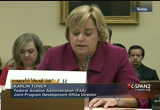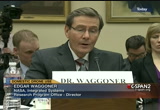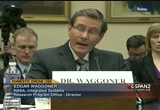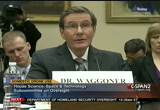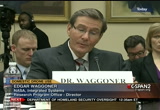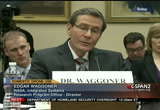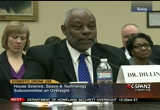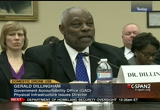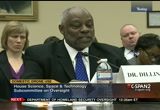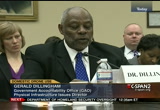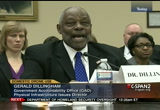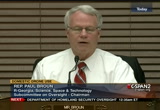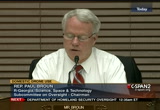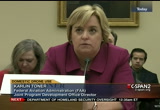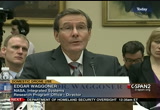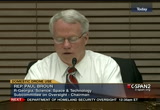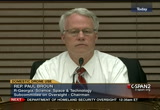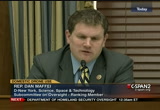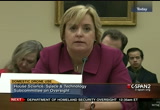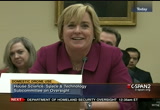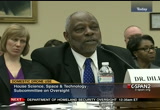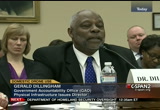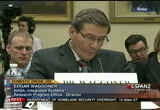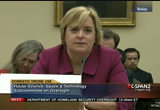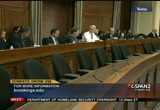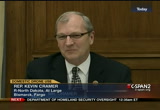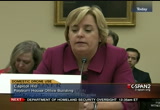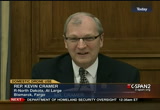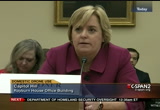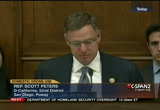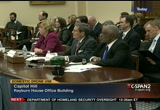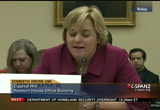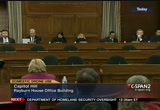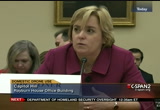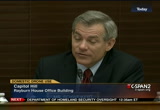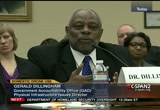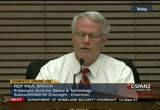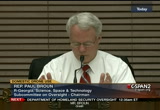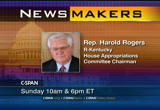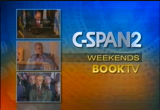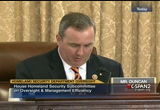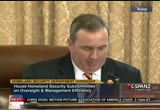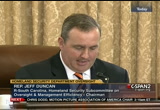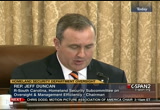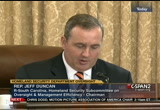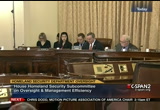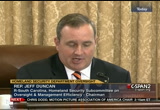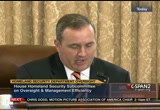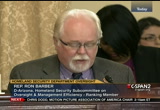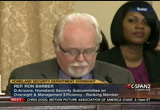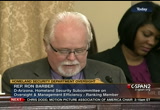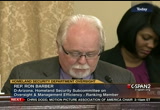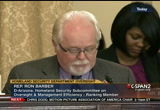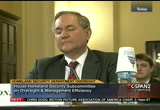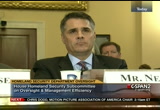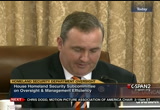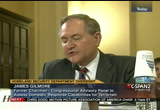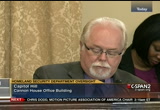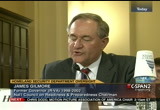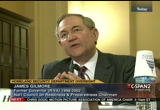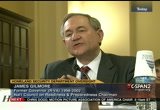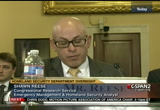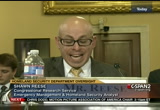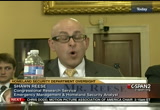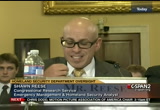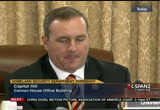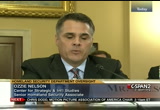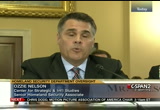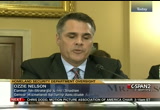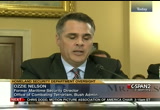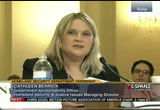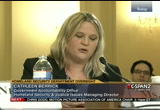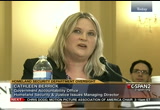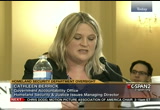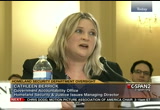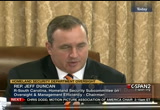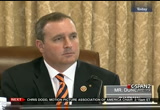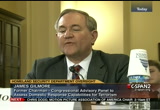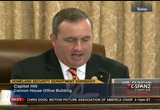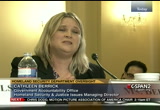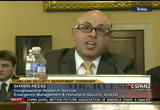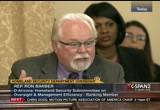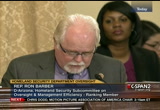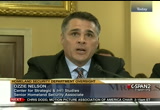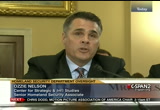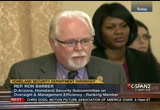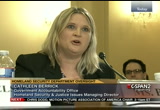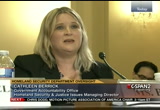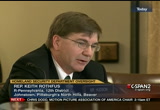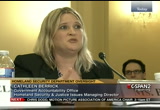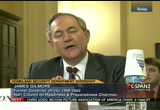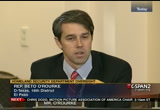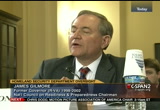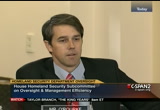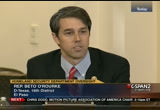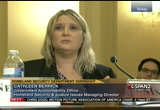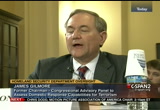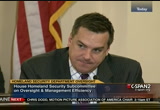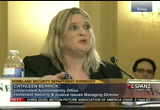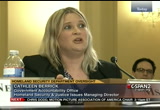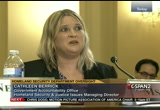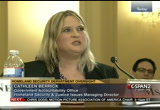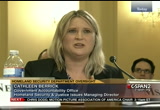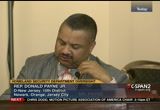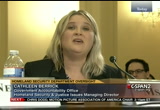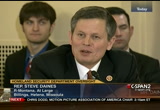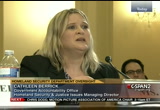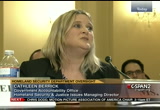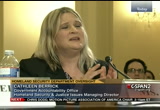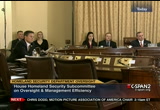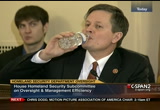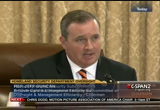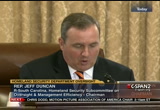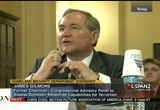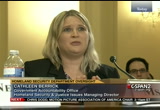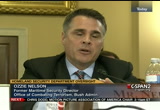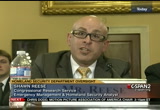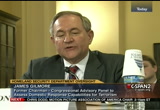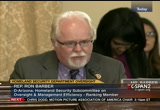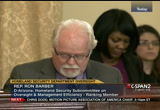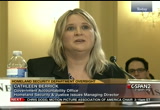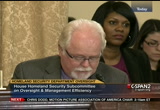tv Capital News Today CSPAN February 15, 2013 11:00pm-2:00am EST
11:00 pm
11:01 pm
the new technology would be the answer, but 12 years ago technology had not yet caught up at the station. last year he gave thanks to the production team that pushed themselves to deliver some thing never been done before, a marvelous movie was created. this is another example of why we go to the movies to be astonished into dream as well. it was all of this technology, innovation and creativity, ticket price to consumers has remained remarkably stable over many, many of us, roughly dollars. other than listening to music, watching free tv programming, the most affordable, accessible entertainment is watching a picture inside the state-of-the-art theater. that's why they've told theaters
11:02 pm
continue to try were people than all theme parks and major sporting event combine. it has never been a better time to be a consumer of movies and television. because it is not up to more people in workplaces want to watch them more times across multiple platforms, the film and television industries innovating to meet that demand. today's movies and television shows can be viewed in theaters on big screens are at home on tv screens, laptops, candles and smartphones. more than 375 unique place in online distribution services around the world provide high-quality on-demand film and television shows, offering the easiest, fastest, highest quality product and experience possible. these caters to every manner, including rental viewing,
11:03 pm
subscription viewing in support of. distribution services are provided babic movable type of commercial entity come including technology companies, broadcast networks, pay channels, internet providers, retailers and content renters like amazon, netflix, itunes and voodoo. the next time someone suggests the industry is not innovating fast enough to satisfy consumer demand you might remind none of these innovations that she shared with you. to paraphrase sunset boulevard pictures may be getting smaller, but movies are still digging about to get even bigger. increasingly the times are creating television and online audiences love. the cable stations are gaining content providers such as hulu announced it will produce a
11:04 pm
program battleground. amazon will develop pilot and feature films and netflix has invested $100 million to produce exclusively for subscribers a remake of the classical series, house of cards. these innovations are great for consumers. i'm not exaggerating when i say a golden age in television and film is being ushered in. you can watch more content than ever through our channels the quality of television shows is outstanding and getting better every day. that is why it's so crucial that we protect this content from theft because his numerous deserve more than any other reason to enjoy the first generation versions of films, not secondhand pirated films shot and recorded inside a movie theater on a mobile phone. must strike a balance between the desire for a free and open
11:05 pm
internet, which i strongly support and protection of intellectual property. the future cannot be choosing one over the other between protecting free speech or intellectual property. they should and must be about protecting both. we can msn internet that works for everyone and we can msn protection for the genius that an actual part he represents. there should be no confusion. more than 2 million americans depend on the motion picture and television industry, freeing up and cannot be synonymous with working for free. to protect property and freedom of the internet, they must work together to innovate our way to charges. silicon valley and hollywood are making progress on this front and i applaud them for doing so. so to answer the question next month, why do movies not her?
11:06 pm
did not her because of the enormous contribution to the creative art form. movies not because they elevate and enriched the landscape of our country. movies position america favorably on the global stage both politically and economically and directly or indirectly puts it on the table of more than 2 million of our fellow citizens. the movies deliver value to the sooners from their affordable price point to delivery across multiple platforms, but most of all, mavy stoddard because they educate and inspire. they have the power to change peoples minds and even allies. films like "to kill a mockingbird" and platoon had a profound impact on me as a human name and i'll never forget them. if i ask each and every one of these today, you point out are suggested thursday film, i suggest each one of you could answer with a film that
11:07 pm
motivated or changed in many ways. set them on the company did answer the question i would tell you just proved my point answer the question is not almost two years ago. movies do not her in a thank you for listening this afternoon. [applause] >> i'm having a marco rubio moment. [laughter] >> thank you, senator. we have a wide variety of questions. i hope you're ready to cover the landscape. starting off with of course a topic import in washington right now, the country violence, gun violence. the president in his state of the union made an appeal to reduce violent pay what about reducing the amount of violence in movies and is 30 from so much
11:08 pm
shooting on the screen? >> that's a great question. as you pointed out in your remarks, one of the first things we did is we are gathered here a few blocks away at the white house. the president was giving up this morning citizens of word to a number of people. they worked very closely as you mentioned here we spent 30 years together work on everything from autism and childcare, so i was very honored as one of the authors and founding of the peace corps, which he served in the 60s. there were people in newtown, connecticut who saved. i represented newtown for 30 years. the night before december 14.
11:09 pm
i have a hard time talking about it. so i care about it deeply as you pointed out. i spent 30 years in the senate working out issues on children's issues, six are deeply about the subject otterness out of this important supporting the administration suffers, the vice president's task force to look at these questions and said we want to be part of that conversation i may have been in many ways. but that executive order, regulation establish the rating system in the 1960s to provide tools for parents to a better choices about what their children may see. over the years, the system has evolved in the late 1960s to the pointed at their smart descriptors involved and so forth. technology has changed.
11:10 pm
of course today is is a mentioned already the amount of platforms provide so many more places it can be we are working it will be a part of that in the coming weeks. we already are part of it. i think it is an important issue they were going to be working with the administration to find out ways we can be supported. the me tell you what the spaces for us. i feel very strongly that this country -- this industry has been in the forefront from its inception. films that are charge and provoke not always were received warmly because they look with more favorable as been released at the time. but we found is only provide
11:11 pm
choice for entertainment, we believe very strongly in control giving parents the tools they have to have to make decisions they want. when the child is out of their home, but with a seat? what can you learn about what is available to them? and thirdly, they educate the people are wherewith those tools are and how they can access than many modern technology, including websites and so forth. so the choice, control and education are the three legs of that second piece of control is where we feel very strongly. we do as much as we can to provide the tools and give people the choice is the days they want to have. >> what is your opinion on the amount of violence in movies? is there too much credit and if so, should hollywood do
11:12 pm
something? >> the audiences buried in our country. we produce product and give people choices and people ought to have information about what they see with a walk in so they can make a choice to pay that price and that pink you get in the business says content and that's a slip or slope and you've got to be careful about that. there is a temptation, but the best these to be had is giving people information they need to make the right choices for themselves. particularly parents so they cannot control what comes in their homes and better information about what exists in their children go out the door. >> have you had a chance to talk with president obama himself on the gun issue? if so, what if he told them? >> now, i have a hunt that. he might do you to? >> the calls come from him to me. i'd be delighted to talk to him,
11:13 pm
but he's got a lot on his mind. >> is it fair to paint video games and hollywood films as a fact or not shootings? >> is sort of predict the bullet and away. there were people who suggested, a further reason for people before any of this existed. if you look at the history, this kind of a lurching to suggest that this is the root cause of the problems. and we take advantage for one in and suggest something and not his debate that goes on in the introduction was involved in these issues. it's not a seventh-largest producer comes. we were number one, but if you asked me where we need to be focusing a lot of our attention, it is in the mental health base. i mention the mental health parity legislation.
11:14 pm
pete domenici, ted kennedy, many others. gordon smith. we are deeply involved in this, but it happened to have been chairing the committee of the florida senate. my hope is with much more pyrotechnics about guns and media, and and i hope his luck may not produce the results in congress, the mental health space if we don't do anything else, finally put meaningful resources and to discourage a mental health. i don't know how many of you read that blood by the woman who announced she was the mother of a child very much like this for and took the lives of the children in newtown and a lot of anxiety and not many opportunities to access the mental help they need. i used to say to audiences in congress, is there anyone in
11:15 pm
this audience who hasn't been touched by this issue either at home, people you work with are people you're close to? i've never been audience for a single hand was ever raised. everybody understands the issue of how devastating it can be. that's the space we really need attention. [applause] >> a bunch of questions about "zero dark 30". what do you make of the controversy over "zero dark 30", lawmakers have criticized the known for its depiction of torture? >> welcome i had the opportunity to introduce captain niccolò and i'll say what i said to that audience. first of all, it's a movie. you need to understand what that means. there's a lot of poetic license and artform and this is not a
11:16 pm
documentary. obviously it is real-life events that have been in my view is they wanted to tell the story of what transpired over a decade that ultimately led to the successful apprehension and the killing of osama bin laden. part of that story involved in hand to interrogation tape needs and you saw them on the film. , suggested is futile that tenure story it might have even been a greater criticism for disregarding some years. it was also clear as i saw it, and i've watched a couple time. in my view, the films that ultimately the reason we were able to find out the courier was a lot of reason, some of it purely accidental. some of it was incredible americans whose names on a vessel and i'll hook it every morning to go to work to keep us
11:17 pm
safe, to stare at computer screens, trolling for data could give us information to keep us safer. that film celebrates the incredible hard work that gets done by people whose names and faces will never ever know. so put aside whether you think is a good movie or a bad movie. i'll leave it to critics and writers at the oscars. but whether captain bigelow try to make historians hobart lives of american people, she achieved that goal. [applause] >> you mention the movie rating system. sensor and a place dedicated to transparency, could you address secrecy about the songwriting process in which you favor bringing that in to the open, including more transparency about the people making decisions and how those determinations are made?
11:18 pm
>> nothing static about it. it actually goes even further back. the first head of the mpa was a fellow by the name of hayes and not go to eric johnson and then it was jack for many years and dan glickman and myself. this was an effort to get away jurisdictions have corroborating stories comest you can imagine him trying to produce a product that had a national audience tailoring to various markets around the country. so the idea was to, but the national rating system to try and provide that guidance for people along the way. obviously it goes back to the haze rules that seem almost comical today for what they were in the 1920s coming along as to what we accept as a 21st century audience.
11:19 pm
there's nothing concrete about this. you make judgments based on what public mood and attitude and sensibilities i received a forwarded en masse at the rating board do and still does. i am on the appeals board so when producers and directors appeal of reading along the way. so are constantly examining are we doing this as well as we can? are never going to have it perfectly well. forget it the international audience. a domestic audience has very different ideas of what a success to pull her unacceptable. so to try and come up with the best you can sue people have as much information to make the decision i mentioned earlier. we stayed away from advertising because you can imagine what that would provoke an invite. these are people who come from what we call families across the country to represent geographically the kinds of views might be represented very
11:20 pm
serious for some different days. economic backgrounds that are not from one set or another. you never had that perfectly right either. we passed over the years the american public, how are they doing? most recently a couple years ago before the most recent incidents occurred and it may change what happened now in newtown for aurora. i can't tell you that. best of a year or so ago, when asked the question, what do you feel about the rating system? the numbers were very high, about 70% of people having a favorable response about the use of the reading system to make decisions. so what does a pretty good job in a difficult space to represent values and ideals of the people as diverse as we are.
11:21 pm
>> you talked a good deal about the chinese market and how it's expanding. as the mba working with the government to allow for release of additional american films and especially non-censored american films? >> sure. for many years laments are not just us, it is global. only 20 foreign films including around could be screened in the chinese market them as a result of a chip eto, world trade organization case negotiation of a trade office did a terrific job, were able to increase to 20 to 34. obviously china decides that it's going to allow the viewing public to see and said they do control that and that's great surprise. they have their own standards of what they assert that to allow to be show in their theaters.
11:22 pm
i mention in my remarks that what has happened is despite the size of the country, very few theaters in china. recently the chinese decided this is something they want to provide for their consumers and build in opening up 10 new screened today in the country to the point where they have 11,000 a few sicko was a handful. so we're working on it all the time, going back and forth then again there some issues that come up, but we think it is an opportunity and i say this in a parochial sense, but our country has benefited tremendously over the years because of an american film industry. it doesn't mean every film are necessarily proud of. i was attending one of these festivals in australia, first trip to that country in an
11:23 pm
individual who is in the business started out by saying, i have a strong disagreement with your country and foreign policy. you kind of hear that to some degree of certain places. they want said i want to say i know few other nations to not only tolerated and industry examine, ridicule, tack to challenge public and private institutions as you do in the united states and to top it off he goes in the words for doing it. he said as much as i get upset with some of your policies, no other nation in the world celebrates the freedom of speech and the welcoming of ideas. we had an idea tonight other night for george stevens, george stevens junior, a rich tradition this in straight spent most of his life in washington. as a peace corps volunteer in the 1960s when george stevens is the head of the film and television division under edward
11:24 pm
r. murrow in the kennedy years they produced 300 documentaries a year. i remember way way up in the not villages on the border with haiti, getting documentaries because there is no electricity, putting up a sheet to screen one of george stephenson documentary. many of them are not flattering. her numbers show a film about the nine, but i remember the audience in a remote village getting an appreciation we weren't afraid to to talk about ourselves and how were all trying to get that better. kathryn bigelow, you know, what was done with lincoln, in a way that probably more people know about the 13th amendment today as a result of that film the
11:25 pm
world over in a sense. it is a remarkable contribution and the idea we can show and demonstrate who we are out to be welcomed to come us so we'll continue working to get more product and because they believe to see what remaking and it's good for us to have that opportunity. >> the transfer has backed copyrights for works decades ago. the question asked of possible public good could come of extending copyright. is this a huge giveaway to studios and publishers? >> read that again. >> extending copyrights world movies. >> the only specific law written into the constitution of the united states in 1789 was copyrighted with broad values
11:26 pm
inc. and not a you document. the only specific recommendation was copyright and the responder for film or television, but we are young country we need to protect innovations in creativity and it's unfortunate the way to debate seems to come down. this is all about hollywood and technology and suggesting copyright and counterfeit goods and security issues are not included in this discussion. i'll repeat what i said earlier. to me i think what has occurred technologically is so incredible and how much we benefit of having a free and open internet that works for everyone. it's exciting beyond words that it exists. i also happen to believe the innovations, creativity produced here and elsewhere are also worth detecting on preserving. the issue becomes, can these two worlds exist together?
11:27 pm
i believe they not only can but not super going to succeed. i spent a day last week at pixar in the bay area in los angeles, now a division of the walt disney company. if you get the chance, they have two words. you look at what the world ought to look like. this content type allergy producing masterful works, really phenomenal but did she accomplish. i like to tease people in california there is the global capital content in one city in a car right where's the global capital of technology. for some reason the same country and state is to go couldn't figure out how they needed each other and raskin all of us to make a choice. pick one site has it been the end will benefit if one loses one and. content is technology. technology needs content. i'm working to find ways in which we can bridge this gap and a lot is happening.
11:28 pm
we're stepping up on the first pages, illegal sites and add brokers, payment processors to make sure we strip the financial advantages that of illegal sites as well. we will have a site opened up in the next three weeks that would give people the chance to learn unintentionally they've been downloading the product without any punitive implications, working on the assumption that most people ever form something they are doing outside of the legal space full text pearce or any number of things occurring in that area. you have asked a question, but i'm not enthusiastic about legislation. read to find ways to achieve about to make makes sense to everyone and stop asking people to pick one side of this equation is this somehow are going to win if that occurs over an athletic contest rather than
11:29 pm
recognizing we need content and technology you for the benefit of everyone in my view. >> privacy legislation westerville because of opposition from high-tech companies. are you talking within industry to work out a compromise and what concessions are you willing to make to get that bill through? >> there's a lot of conversation occurring. most of a business-to-business data suggest without going into the details. i don't know what the details nor should i necessarily. i just know content companies work. most of them has agreements with google already said that it is to business relationships single day and a lot of communication, moving it to content themselves, which will probably raise the profile of content to try and market it. i presume you want to get compensated for creations as well. a lot is occurring within us in
11:30 pm
the right direction in ways. and certainly reaching out and will be to figure out if there's ideas people can bring on how we see that space be filled by those who want to see content and technology. of course technology is changing at warp speed. i mention of incredible things occurring in the content space technologically. anything but old media if you see how it's produced and what is occurring today, it phenomenal in the content space. it's ludicrous to talk about this old media. the extent we can do about law benefit and will require constant or. there's not some point it's all over with. it requires a cooperative relationship that will produce the best results in my view of many people want to understand and step up and make it happen. steve jobs clearly did.
11:31 pm
disney and the board of apple certainly does. you can get on the list of various other people. the founder of ebay, who is also the content side of the equation. a lot of people in the back and forth and have been successful in technology and content and leadership in those elements, but nonetheless the example at pixar is a good example. lucas films is wonderful example, but that idea of having an incredible technology he in san francisco is an example of content and technology, state-of-the-art for all of us. >> will move to a couple questions about your previous life. >> which previous life? >> the one in the senate. [laughter] in light of assignments for
11:32 pm
cheadle for chuck hagel's nomination to a vote this week, do you think harry reid made a mistake enough for sydney will reform the filibuster? >> back to questions about the space i'm in. after 36 years i love my job and integrated server. read the press accounts and get the magazines, but i'm not there and they've got a tough job. by the way, i am optimistic. i am optimistic about the congress. republicans and democrats in my view are going to once again make that institution is in port, vibrant and vital as it has been historically, so i'm sort of a loud, but i believe very strongly. i put on a list of people have great confidence and hope to make a difference in all of this. i happen to be an advocate at
11:33 pm
the simple question is the filibuster rule. that's what the founders intended. if you create nothing more than a year and i can, a, in your image, what is the point of having two chambers? there's a reason why the senate is a counterbalance, with a popular elected official majority rules of the senate was the place for the minority rules in a sense, the proposal to favor a minority of what the founders had in mind this seems somewhat antiquated in a world for all of us want things yesterday. you mentioned what they call binge income instead of waiting 13 weeks to watch a tv show, you can now watch out or 10 episodes on one weekend. the idea we all want everything immediately.
11:34 pm
the ats and patience in a process and a senate inherent to slow and for good reason. there's nothing wrong with what the majority, but we've all learned there could be a tyranny to the majority and some additional thought to make sure that we do the right thing to be done. so that ability to slow that down is important. now if you abuse the privilege of doing so, the pendulum swings the other way and high in my view and it's been abuse to the point rewind up people talking about getting rid of it altogether. use it deliberately when you take it out to used, but don't use it as often as i have seen that for you to run the risk of losing it altogether. i vehemently oppose any effort to undermine not even further than his in the case. >> were almost out of time, but we have a couple housekeeping
11:35 pm
matters to take care of. as a true measure of our upcoming luncheon speakers. we have rushed to hargitay, star of law and order sbu and founder of the joyful heart foundation will discuss her career and how her role inspired her to become an advocate for survivors of violence and abuse. on april 9, president and ceo of the mayo clinic discussing the health care industry in april 12, filmmaker ken burns who will discuss his new documentary, the central park five. second out like to present our guest with the traditional national press club coffee mug. to add to the collection. [applause] >> this year i can accept it and take it. last night >> dirty shirts below the deployment. one last question. >> is always dangerous. >> we have a mystery we hope you can explain. can you help us understand why
11:36 pm
when a celebrity shows up on capitol hill or should cause there's so much excitement in the halls of congress? >> nope. [laughter] >> thank you all very much. [applause] >> thank you for coming today. thank you for not dodging the hard questions at least. i'd also like to thank national press club staff including the broadcast center for today's event. finally, a reminder you can find more information about the press club on a website. if you'd like a copy of today's program, check out her website at www.press.org. thank you, we returned.
11:37 pm
>> i think the women themselves in many cases were interested in politics, but had no vehicle to express that in their own lives. so they were attracted to men who are going to become politically active or were already politically active. >> each of them i find intriguing. probably half of them in particular precisely because they're so it's pure historically. half of these women would be almost totally unrecognizable to most men and women on the
11:38 pm
11:39 pm
>> the subcommittee on oversight will come to order. in front of you are packets containing written testimony of biographies than true and testimony disclosures of today's witness panel. i recognize myself for five minutes for an opening statement. good morning and welcome. this hearing titled operated unmanned aircraft system in the national aerospace system, assessing research and development is to ensure safety is the first hearing for the 113th congress had committee on oversight. during our break, our name change to be general and special investigatory authority to review and study on a continuing basis programs and government activities involving nonmilitary research and development remains the same. i would like to extend a warm
11:40 pm
welcome to our witnesses today. appreciate you guys being here. now some want welcome returning members including the subcommittee's ranking member and distinguish elements from new york, mr. maffei. i look forward to working with u.s.a. ranking member on this committee. today's hearing focuses integrating unmanned aircraft systems into the national airspace. as a pilot i'm extremely interested in this issue. specifically we hope to gain a better understanding of the safety risk the current technological obstacles and key research and development affairs being undertaken to overcome those obstacles. uis has garnered a great deal of attention lately. if you watch the news this morning, there's a lot of news
11:41 pm
about this issue. in january, a documentary entitled rise of the drums, last week's "time" magazine. the same title and of course the administration's use of drugs for targeting terrorists to confront our war on terrorism has come to be a central issue in a confirmation hearing of the proposed cia director, nominee john brandon. however sir, privacy issues beyond the scope of this hearing. i use the term unmanned aircraft systems or uas considered uav or drone. as the name suggests, they are complex systems made up of not only aircraft, the supporting
11:42 pm
communications infrastructure. uas comes in a variety of shapes and sizes and can carry a wide range of missions. aviation has come a long way at a relatively short period of time thanks to american innovation and ingenuity. the list of american aviation and aerospace is very long. you may not know the details of their achievements, but i'm sure you recognize names such as clyde cessna, james snape donnell and donald douglas. howard hughes, william lane, charles lindbergh, kelley johnson just to name a few. unmanned aircraft or the next step in the evolution of modern aviation which began with two american brothers in 1803. just as a revolution in military
11:43 pm
affairs, they will also very likely transformed civilian and commercial sectors. the group in aerospace and defense industry intelligence firm predicts that america will stand over $49 over the next decade. in 2010, the association for unmanned vehicle systems international estimated over the next 15 years, more than 23,000 jobs totaling $1.6 billion in wages could very well be created. this does not include the tens of thousands of secondary jobs in manufacturing software development and other complementary industries. that said, the addition of thousands or tens of thousands of additional aircraft into the national airspace certainly poses safety concerns.
11:44 pm
there's no guarantee accidents will not occur, but we need to take every precaution to reduce the risk involved in the integration. last year congress directed the federal agent fees, including the faa and nasa collaborated in accelerating integration into the national airspace. the faa modernization and reform act of 2012 can tames provision designed to promote and facilitate use of civilian unmanned aircraft. we have a subcommittee know you've been working hard and it made progress towards meeting the prescribed object days, but we also know there are many unresolved issues, both technologically and regulatory lead. again, our goal today is to better understand the research underway to overcome technological issues and mitigate risk involved with uas integration into the national
11:45 pm
airspace system. we are particularly interested in hearing about any advances towards eliminating vulnerabilities in command and control communications. new capabilities in and agreements on technological standards. the "washington post" recently reported that he sent american crashes occurred near civilian airports overseas as a result of pilot error. mechanical failure, poor coordination of air traffic controllers. in august of 2010, "the new york times" reported that a navy u.s. violated airspace of washington d.c. when operators lost control due to a software issue. while this may be more acceptable in remote areas overseas, we need to do much better here in our own skies.
11:46 pm
the threat of command-and-control jamming gps navigational singles spoofing and face hacking a reluctance to earn that has to be addressed before any uas integration into the national airspace. overcoming challenges will require significant research and development investments by public and private sector given our nation's current financials date, this demands more efficient coordination between all stakeholders. i now recognize the gentleman from new york, mr. maffei for statement. >> thank you very much, mr. chairman. and excited for the opportunity to work with you. i want to compliment you for your leadership in calling this hearing today. i hope it won't surprise you on this issue i will be at going a lot of your same comments in your opening statement very
11:47 pm
articulate. aggressive efforts regarding integration of unmanned aircraft systems or uas is a serious issue at present daunting challenges. possible economic opportunity and also potential threats to civil liberties and safety. i know firsthand what a complicated issue that is to present an unmanned aerial vehicle unit operates out of my district at air national guard base on the military side. while commonly referred to as drones, it goes far beyond what the word implies. there's a human element to unmanned flight just as an increasing limit demand play. tremendous potential risk in public concerns associated degrading into the national airs his and my constituents expressed concerns on a daily basis. these aircraft represent an emerging technology with broad uses among many industries that
11:48 pm
could potentially provide benefits to many industries from farmers to firefighters and the meteorologists scientists. however, we need to ensure unmanned aerial systems operate safely and securely. the first must overcome technical challenges and indeed there are many. a 2012 report detailed areas which must be addressed before they can fly safely. chief is the stark reality that elegy to provide unmanned aircraft ability to sense and avoid other aircraft in objects does not currently exist and this is a serious concern. other challenges range from links and eras for communication between the pilot is suckered as a result driven by human actors whether inadvertent or intentional. acquiring spectrum in order to secure communication for operations, particularly as
11:49 pm
needs of the sensors expand it's another challenge i look forward to addressing challenges in depth today. there is a real critical element of any kind those who want that in the pits and ground stations for flight while connected to the outcome of the mission. we need to ensure these elements from proper training and medical certifications are properly coordinated as well. the modernization reform act was signed into law. a planned permanent unmanned aerial systems based timbre of 2015. i look forward to the progress of the last year is a realistic report and meeting deadlines.
11:50 pm
20 years ago, cell phone technology was innocent of the beast of have transferred from simple mobile phones to pocket accessories used hopes all of businesses and owners expand. while security and safety concerns about these devices have existed since the beginning, proliferation and advancements have not slowed. today, more than 315 million cell phones in the united states alone and most not only care cameras come in the gps or global satellites as well. both incidents have not been hindered, there's legitimate limits on the use of cell phones in hospitals, airplanes and while driving your car. it should be an analogy to us. despite all recognize challenges , whether we like it or not, for better or worse, this technology is here and not going away. but the public sector and commercial site for remains
11:51 pm
interested in that continues to evolve and expand. as a result we must develop framework to handle u.s. emergence safely and securely ensure protection of individual rights and personal privacy in the air and on the ground. like any new technology, it's impossible to predict the path they will take. in tackling the tremendous task of ensuring safe and secure operation into the domestic airspace, we're once again presented the challenge of balancing important issues. private sector issues might help her out the economy. the government centrist with representatives are protecting civil liberties, developing a regulatory framework could be in our process, but this hearing is one step towards ensuring this is pat in a timely and effective manner. it is our responsibility to recognize the need for oversight to ensure proper steps are taken
11:52 pm
and federal agencies are meeting the critical timeline to address rapid emergence of these uas systems that are airspace and that's why went to compliment the chairman. thank you for your leadership. i want to thank witnesses look forward to your testimony. thank you ramage, mr. chairman. >> mr. maffei, i can tell you and i are going to be close colleagues protect the civil liberties and privacy issues because those are extremely important to me and have been for a long time, since i've been here before i came here. have they to introduce her witnesses. our first witness is director of joint planning and development at the federal aviation administration. the next witness is dr. edgar
11:53 pm
waggoner of the integrated system program office at the the final witnesses dr. gerald dillane hand, director of civil aviation issues at the government accountability office. as witnesses should no, testimonies limited to five minutes each after which the members will have five minutes each to ask questions. i now recognize dr. toner to present her testimony. >> thank you, mr. chairman. good morning, chairman brown, congressman maffei the members of the committee. i appreciate the opportunity to appear today to discuss the aviation administration currently search in support of unmanned aircraft systems integration into our national airspace system. i am director of the joint planning and development office somewhat touch upon the role my
11:54 pm
office space in facilitating and court need enough for his throughout the government with partners including departments of commerce, defense and homeland security, nasa and the faa. i'd also like to take this opportunity to speak to you about the solicitation and the faa announced yesterday requesting interested state of local government, eligible universities and other public entities to develop six research and test sites around the country. the solicitation was done in accordance with the modernization reform act of 2012, which directed the faa to establish the test site in order to conduct critical research to help determine how best to safely integrate the systems into the site selected they did this year, we expect to learn how they operate in a different
11:55 pm
environment than impactor traffic operations. the test sites will also inform the agents he has we develop standards for certifying unmanned aircraft to determine the necessary air-traffic requirements. in addition to the test sites, essay is published a notice in the federal register, asking the public to review privacy language and provided good. the broad outline of the privacy proposal will require each site to ensure their privacy policies address the following. notice for awareness, choice and consent, access and participation, integrity and security and finally, enforcement mechanisms to do with violations of these policies. the faa thinks a test sites will provide important information that will inform our uas process moving forward. with respect to research and
11:56 pm
development efforts, we are working in four areas. control and communication, maintenance and repair and human factors. research in all four areas is critical as the opening statements have mentioned. a written statement contains more details on each area, but i'd like to take a moment to highlight the work we are doing with nasa in the area of control and communication. dfa is collaborating collaborated on prototype architecture views to develop a high-level security risk assessment. our joint work will define the architecture and security mechanisms for protect data communication that can eventually be used to develop security standards and requirements. likewise, partner agencies have mission related incentive for integration to succeed. leveraging research done by
11:57 pm
different agencies to ensure all agencies are aware of and can benefit from work done throughout the administration. this synergy, such as the nasa partnership by describing shores of research dollars are used as a fact early as possible to reach our common goal of integration. i certainly understand the desire to safely integrate uas into the now. because the mission is to ensure safety and the, integration can only occur to the extent that they have satisfied the safety when not be degraded by these new aircraft. this is an extremely complex endeavor, it is in charge of complex problems in the past and the record is a testament to the fact we've been able to meet these challenges. mr. chairman, this concludes my statement now be happy to answer
11:58 pm
questions. >> thank you, dr. toner. it was perfect. thank you so much. it's excellent. i now recognize dr. waggoner for five minutes. >> chairman brown, rick and never maffei, thank you for the opportunity to testify under research and development activities to ensure safety and operation of the aircraft system in international airspace. these are going to need to routinely fly in our national airspace system and ensure you are aware unmanned aircraft are increasingly used for applications for not feasible to rely on piloted flight. we often refer to these as a dull, dangerous or dirty mission. application of aircraft to perform missions is part of what's driving critical need for safe, let's restrict his access. save retain access represents enhanced capabilities for the
11:59 pm
public sector, but also promise of new capabilities for commercial or civil aviation sectors as well. nasa's performing research that provides an opportunity to develop in transition or concept, technology, operations and knowledge and other stakeholders to help define algorithms regulations, standards for safe retain access. i want to make three key points. how we are working to transfer results with stakeholder community and looking for is a but not sick figures areas where additional research is required. one might ask, why aren't you routinely around now? for unmanned aircraft, access is hampered by regulatory challenges, making it difficult to establish standards and requirements.
12:01 am
the requirements necessary to define criteria for avionics communications systems and ground control certification. in each of these areas, we are addressing critical research questions and delivering research results were stakeholders. the work that nasa is performing depends on the external government agency. i would like to identify three key areas where we are involved. the executive committee and the joint development office, apo, and the u.s. aviation, the usa are. in each of these cases, nasa is playing a role supporting activities from the executive level down to our faa and department of defense. our focus is unmanned aircraft
12:02 am
systems. finally, i would like to identify future research areas where nasa is undertaking studies to evaluate faith integration of the next generation system, commonly referred to as nextgen. it is referred to a relatively immature research area everything could generate additional focus. issues associated with this are particularly relevant when aircraft involved are not under air traffic control. we know about the work that the dod has reform. we would like to a sunset. i would like to leave you with this thought in conclusion.
12:03 am
you'd like to transition to the stakeholder community. general brown and members of the subcommittee, this concludes my statement. i am pleased to answer any questions at this time. >> thank you, sir. we appreciate it very much. excellent testimony. i am sure that doctor gerlad dillingham will give us an equally excellent testimony. you are recognized for five minutes. >> we do what we can, mr. chairman. breaking member, members of the subcommittee, as you requested, my testimony addresses three areas for integrating you af into the
12:04 am
system. progress in compliance in 2012 faa reauthorization act end r&d efforts by key immigration challenges. congress has passed faa to reap the immigration into the national airspace system. successful integration revolves involves agencies, dhs, and nasa, as well as industry stakeholders. faa has taken several important steps to facilitate collaboration among the stakeholders. for example, they have established several working groups and various memorandums of understanding and cooperative research and development agreements to address a range of integration issues. the faa has also recently created the uaf immigration office with executives to coordinate usaf efforts across
12:05 am
the faa. our work on other federal and industry collaborations, such as the implementation of the next generation air transportation system has shown that early and continuous involvement of stakeholders is critical to success of the project. with regard to the implementation of the provisions, a written statement contains a chart of selected requirements and status of efforts to meet them. most of the requirements must be achieved between may of 2012 and december 2015. our work shows that while faa has efforts under way to meet these requirements, they have completed only two of the nine requirements with completion deadline to pass as of this morning. of the deadlines missed, we have not yet established a program for the six usaf test sites order entry and. these include key integration.
12:06 am
some are complex undertakings it requires significant amount of efforts by faa and partner agencies, and establish deadlines can increase stakeholder confidence in faa's ability to use the uaf immigration effort and contribute to the participation and collaboration among all stakeholders. regarding research and development efforts. the r&d roadmaps identify obstacles to prevent it from being allowed to operate safely and routinely. some of these obstacles and related research include vulnerability to uaf operations, command-and-control, gps and spoofing and human factors. while progress is being made to address these obstacles, the lack of necessary data has
12:07 am
seriously hampered the development of safety and reliability and performance standards, which are needed to validate the r&d efforts. in addition to the technical obstacles i have cited, government and industry will need to work together to address these issues related to public acceptance of uaf, especially as related to privacy and homeland security concerns. mr. chairman, ranking member, and members of the subcommittee, the potential impact of this industrial sector on the aerospace industry and overall mobile competitiveness could be significant. as the chairman noted, in addition to the life life-saving potential, according to an industry forecast, over the next four decades, a worldwide market for government and commercial use of uaf will grow to be worth $89 million. the united states for account for nearly two thirds of the $20 billion for the projected
12:08 am
r&d investment for u.s. technologies. this growth will be critical for the faa to make progress in integrating uaf into the national airspace system. it highlights the importance of the issues that need to be addressed. thank you, mr. chairman. >> thank you, doctor gerlad dillingham. you did an excellent job also. we thank the witnesses and we all appreciate you being here with excellent testimony. hopefully the questions will be answered not only in this hearing, but also through written questions as we go along. limiting questions to five minutes each, the chair will open the first round of questions. the chair will recognize himself for five minutes. >> on december 4, 2001, the u.s. lost in our q1 70 signal near
12:09 am
iran. iranians seem to have spoofed the global positioning system gps signal, it was in our operation demonstrates that it is possible to spoof the gps signals to take control of unmanned aircraft. unlike signals that are not encrypted, it makes it vulnerable to counterfeit or spoofed. what r&d is being conducted to address this concern, and are there any r&d gaps you are aware of? >> doctor, if you could start off by answering questions and
12:10 am
providing and fill in any gaps that are left out? >> thank you, mr. chairman. you mentioned the careful instrumentation that was conducted by doctor humphreys and his students in texas. i want to point out that we are aware of those and security of the communication control system is one of the things we have looked up for a uaf. i mentioned in my testimony this very thing. what i want to point out is that experiments were very carefully conducted at heart repeat. that said, we must be cognizant and the faa has initiated a group that is looking at spoofing. there is also looking across the government at gps systems and concern in that area. we are working on multiple levels to address it.
12:11 am
>> we are also aware of the work that doctor humphrey stood at the university of texas. this has economic implications in our economy. our economy runs on gps now. we are aware of this. we are certainly, in our work, we are working to make sure that there is adequate redundancies that we could test so that the system not only relies on the gps signal. another situation and issues associated with that as well. out in our focus is command and making sure frequencies and thea that we transmit is reliable and
12:12 am
valid data. from that point of view we have a robust research effort going on in that spot as the gps signal, we are aware of it. we are cognizant of what doctor humphrey said. it is part of our knowledge base and the constraints we are operating under, but we don't have any particular research efforts this. >> not only because of safety, but if doctor humphreys and his students can spoofed the gps system, what else can the terrorist groups still. with commercial uaf operating in the national airspace, using encrypted command-and-control
12:13 am
and navigation. >> does that sound right? >> military today uses encrypted links. i believe that a solution may not be as viable for the commercial market. that is the reason that so much research is being done today. >> you have any additional information on this? >> my time is just about up. please answer this question if you were. in 2010, maybe lost control of [inaudible] and violated airspace in washington dc. what is being done in the event of a loss? >> anyone? >> work that we are doing that would come into play so that is
12:14 am
where economy would take over, if there was a loss, he would go to a predetermined position in order to reestablish this or return to base. >> we still have a problem in this case? >> that is correct. hopefully we can have that taken care of you that this doesn't occur anymore. i am sure that it causes a lot of consternation in washington dc. my time is up. you're recognized for five minutes. >> mr. chairman, thank you. i found your questions and answers very enlightening. clearly there is a national security development. on 9/11 was not military airplanes that particular but civilian airliners and the same could be true of others.
12:15 am
maybe a civilian craft being taken over here. we will look at those things. doctor, you said that the faa will not integrate uaf until he can be sure of the safety of the national airspace. i assume that you mean in all these respects. doctor wagner echoed that. given the fact that we have an aggressive timeline set out in do you believe you will be able to integrate this into the national airspace by the current deadline of september 2015? if you're not sure that you can, are there things that you need from us in congress to help make that happen for expedited? >> sumac one approach is a phased approach. we are very cognizant with the act of 2012 by 2015. we viewed as the beginning. if you look at the f-22 today,
12:16 am
it is not fully integrated. it is a manned aircraft, but it is not integrated into the air traffic control system. we are taking a phased in approach. in 2015 we will have integration beginning. but as we move towards the system, there will be new capabilities that make this an even more efficient integration and more varieties of aircraft. so i think the important thing is that we look at it as a rolling approach as we focus on the manned aircraft. >> what do you need from us? >> the congress has given us a lot of attention and a lot of support. we would ask the opportunity to continue to explain the difficulties and challenges and our progress as we are rolling
12:17 am
this out. >> okay, thank you very much. the chairman and i have both expressed concerns about privacy and civil liberties related to the ua -- uaf air force centers. well, let me ask you who is responsible for regulating these issues such as privacy concerns. if everyone can answer, if you have opinions. >> sir, we have looked into this. i think the best we can say is that it is unknown at this point. when we did our work, we asked him about it. they said that our area is safety and that is what we will focus on. a number of different privacy regulations and laws exist, but none of them have been tested with regard to uaf. i think the rest recent posting
12:18 am
that was put out by faa to seek comments on privacy issues will be a start. from our perspective, that's one of the big obstacles for integration that is public acceptance and public education and public concern about how the data will be used. >> the other two witnesses please feel free to answer. it also seems there is no agency that is working on education or etc. >> not so much an agency, but some of the industry associations. some of the model airplane associations are trying to educate the public or at least inform the public. i think one of the things that we keep in mind is that no matter what kind of technology is out there for good, there will be some who will find a way to misuse technology. it becomes very important that the public recognizes those issues as well.
12:19 am
>> is there anything to add? >> i have one more question. >> yes, sir. quickly. i am not an attorney or a legal expert on us. we go to a lot of questions about this. the consensus is that yes, privacy is not the faa's responsibility. there are legal precedence that i said relative to technology and surveillance. the legislators and the community really needs identify ethical issues are and how these different from a uaf to a manned aircraft. the issue that was mentioned, it really needs to be educated in regards to these admissions.
12:20 am
>> thank you very much. mr. chairman, you and i may have to roll up our sleeves and do a little bit of bipartisan work. one quick question, and it can be answered in writing. we really appreciate the fact that the faa took the first formal step in selecting the test site by releasing the screen information request and document to the public. while i realize this may not be your exact area, nonetheless, i may have some additional questions on it once we review it. in terms of trying to decisions on what you're really looking for. i would like to get your commitment to a timely written response to that. >> yes, we will provide a timely response. >> sir, the committee will have the opportunity to give written
12:21 am
questions to the witnesses. we have already talked with them about that. they are willing to give us expeditious answers to all these questions. i know that all of us have questions and always have concerns about this. the american public is frightened about the use of this could possibly have invasions of privacy and civil rights and i am interested in making sure that we protect privacy issues and civil rights issues. it is something that i have been focusing upon for a long time. not only this issue, but cybersecurity and everything else. >> we plan to work with you on this issue. >> mr. chairman, we have to at least figure out who to go to first. in the administration. so that it doesn't fall through the cracks. >> absolutely. no matter who is in the white
12:22 am
house. this is an extremely important issue. it is a constitutional issue for me. sir, you're recognized for five minutes. >> thank you, mr. chairman. thank you to all the witnesses. you have done a good job answering the questions. i appreciate it very much. i appreciate the opportunity to meet you before the hearing. to have somebody who has actually spent new year's eve in north dakota as a witness of my first year in this area. in north dakota we were quite pleased yesterday when this was released. it's been a long way and we are grateful for the opportunity to be one of the 26 states that apply for the designation. i would say given that you have spent time in north dakota at some point, i hope you take into
12:23 am
account this very thing. the other extreme is the same in the summertime. i would be interested in this juxtaposition of the privacy issue. as i understand it, we have a 60 day window for public comment on the privacy question. am i correct or not? >> yes, that is correct. >> does that have anything to do with the designation of the test sites? is part of this, but not part of the criteria to be considered? >> we are working to get public input on that criteria. we will be evaluating the proposals and working to make sure that we are doing a good
12:24 am
job. >> getting back to some of your earlier criteria about the collaboration and coordination and cooperation, that would fit into some of that? >> you know, i can't comment on the collaboration in terms of the proposals themselves. but from my office perspective, we need everybody rolling in the same direction on this issue since it is so complex. >> the point of the question is to make the statement, given that you have answered all the questions so well. going back to the criteria, we are against speaking for constituents who are interested in is because we are a big aviation today. as you know, we have school of aerospace sciences. and the aviation school that that is very much a part of is
12:25 am
that the governor has put together. it is called the airspace integration team, a state effort to do exactly what we need to unify all of the institutions under one collaborative effort. to try to get this designation. we think this is possibly second to the extreme weather. i would have a question about proximity with canada. would you consider that concern one aspect, being a border state. what kind of collaboration we have, if any, with the canadian government as we test this? we like to deal with a lot of international aerospace. >> we have laid out what we believe are a wide range of criteria. criteria that we hope will attract a wide variety of offers, including north dakota. i can't come in today on interaction interaction with
12:26 am
canada. i can get back to you if needed. >> if you could, that would be great. mr. chairman, you have done a great job of answering the questions. i yield back the. >> you're recognized for five minutes. >> thank you, mr. chairman. thank you for the opportunity to serve with you. i look forward to it. i have a pretty simple question about spectrum. more than 7100 jobs in the uaf industry and we have seen these vehicles used for environmental monitoring and the great application that exists there. in addition we are also home to qualcomm and the wireless industry. that is our largest employer. my question is about the bulk of the spectrum resources and whether any of you have reviewed
12:27 am
what the potential spectrum will do in the united states five or 10 or 15 years down the road. >> we have worked with the fcc to reserve spectrum for the command and control of these vehicles. we can get you the specifics on. we believe with our assessment of the market for operation today, but that should be adequate and this is a point that we will be studying to ensure that as well. >> i think that is fair. i appreciate looking into the privacy concerns. i appreciate the update as we go along. sir, i appreciate the opportunity and yield back. >> thank you, mr. peters. there is one question. >> i just want to apologize.
12:28 am
>> mr. david schweikert come you are next. >> thank you, mr. chairman. you are from arizona. we actually have a number of manufacturers producing products. i'm going to have a couple of different questions. the first one is particularly for the faa. the r&d roadmap and the deadlines and my understanding is supposed to be built in it. where are we timewise. what should our expectations be a deliverability. what do we expect to see in the next year or two? >> thank you, that is a great question and i will probably run out of time to explain the answer. >> i am assuming you are talking about what we are talking about
12:29 am
about a year ago. the challenges we had identified were a good start. they were a snapshot in time. we would need additional vetting insurance for the regulatory folks with our research program. during the past year, my folks have worked tirelessly along with the government partners. we are very close to the coordination of a set of national goals and objectives of getting a single point of view that we can use as a measuring stick for progress. we have set up a framework for how we can prioritize the challenges. we know that we have many of them and we want to make sure that we cover them all. we are looking forward to the point where we can share that with the folk community. >> as you go through the challenges, will you be
12:30 am
publishing updates in saying this is what we are seeing, here is our status. i know one of the things we have great frustration with his missed deadlines. i think in our roadmap report, we have for the promise of data. >> would we be seeing something incremental data and publications? >> we have not released incremental the least incremental publications. it is very important to the five agencies that we have been working in partnership with. it is very important to us that we get agreement with the agency's and we have done the coordination. we are in the last steps of coordination and release a comprehensive package. >> my friend from civil aviation.
12:31 am
>> we can report a couple more years ago. we show the progress and monitor the progress and we have not seen a comprehensive plan, yet it has been delayed as well. if our recommendation is adhered to, the kinds of things that you are interested in an asking for should be included. >> okay. sort of tight end. being from arizona, and i have this gentleman as a constituent who was a high-end engineer, lots of resources. i appreciate the german who
12:32 am
flies over my house and sends me pictures. what are we seeing from the hobbyist world. are they running ahead of this. are they heading towards dangerous conflict. what is going on there and are we about to see clash of cultures and people going off on her own? >> this is a sensitive and difficult area. let me try to respond. the 2012 reauthorization act actually prohibits faa for making regulations related to model aircraft persons who operate model aircraft. there are existing regulations that suggest that if you operate it in accordance with principles that are there now, but that would be okay. but there is a way for faa to intervene if you operate dangerously. the model aircraft association has issued guidelines that many
12:33 am
adhered to. >> thank you, mr. chairman. >> absolutely. the american public is concerned. that is the reason the news media has been focusing on this issue so on. i appreciate it. sir, is not trying to ignore you in any way. were any of these embers. i trust you guys will continue to monitor and report back to us on the ongoing basis. keep us informed. doctor, if you would provide for
12:34 am
the record all of the uaf projects as well as fiscal year 2012 and 2013 spending levels. we have not gotten those records from nasa. if you could provide them any information to us in an expeditious manner, that would be great. i thank you for your excellent testimony today. not only is it interesting, but valuable for us. members of the committee may have additional questions. i will talk to you all in private. but we ask for your response to those things expeditiously in writing. the record will remain open for comments and questions from members. thank you. i am disappointed that we have about double interrupt this interesting topic for me and the members of the committee.
12:35 am
americans all over the country and i think c-span for coming in and helping to broadcast this to the american public as we can get the information out. thank you for being here. the witnesses are excused and the hearing is now adjourned. >> this week on newsmakers, we are joined by hal rogers, chairman of the house appropriations committee. to talk about a continuing resolution to fund the federal government and budget cuts known as sequestration in the pentagon and veterans. watch him on sunday at 10:00 a.m. eastern on c-span. >> saturday, but tv isn't savanna, georgia, for live coverage of the savanna, georgia but best of all. joining us will be al gore.
12:36 am
12:37 am
>> the committee will come to order. the purpose of this hearing is to examine the efficiency of the department of homeland security and how likely they are spending taxpayer dollars. let me begin by extending a warm welcome to members of the subcommittee. i'm looking forward to working with ranking member ron barber and we share a strong commitment to support that we need to
12:38 am
protect the homeland. we attended the dedication ceremony of the brian terry port of call center. i look forward to a strong bipartisan cooperation in helping to make the department of homeland security as efficient and effective as possible. i would like to introduce our freshman majority members. today we have mr. keith rothfus, mr. richard hudson, and later will be mr. stephen daines of montana. i look forward to leveraging their experience and let me also thank the subcommittee staff. they have worked so hard to prepare the members of the
12:39 am
committee and i thank you for that. i recognize myself for an opening statement. >> next month marks 10 years since the creation of dhs. in the home and homeland reacted 2002. this terrorist attacks >> of the 9/11 report documents, no executive department had come as its first priority, the job of defending america from domestic attacks. that changed with the creation of the department of homeland security. dhs was established to prevent terrorist attacks in the united states. dhs has a massive challenge by integrating 22 separate federal agencies and components into a unified department.
12:40 am
it is important to always remember the gravity of the issues that they faced in inception and how those experiences affect the current responsibilities with critical infrastructure and develop countermeasures against chemical, biological, radiological and nuclear threats and secure our borders and systems of transportation and manage the federal government's response to terrorist attacks and major disasters. today, we assess taxpayer dollar assessment. the homeland security act of 2002 established 54 statutes. incidences of 2000 and 2001 attacks and the 2010 attempt of the car bombing in times square were my disturbing of her village on.
12:41 am
today many question the resources entrusted to us. in 2004, dhs had a budget of $39 billion. now has a budget of $60 billion and employs more than 260,000 people and operates in 75 countries and is the nations third-largest federal agency. congressional watchdogs have issued thousands of reports with ways to improve the efficiency of dhs and improve taxpayer dollars. the gao exposed billions of dollars that major dhs acquisition programs have occurred. as we learned yesterday, dhs remains on the high-risk list, including the department of management. in addition, the inspector general has identified over 1 billion in questionable costs.
12:42 am
dhs has yet to implement these cost savings opportunities. november of 2012, the inspector general identified significant challenges and how the department manages operations. this includes the men determining whether to declare federal disasters despite spending $4.3 billion and response efforts anyway. it also has been stated that much more work remains consolidate old legacy databases and improves acquisition outcomes. for example, a recent congressional investigation found that tsa has over 200 administrative staff with an
12:43 am
average salary over $100,000, and which this does not include screeners. resulting in tsa spending over $3 billion. half its budget a year in payroll compensation and benefits. according to the press reports, dhs doled out $61 million despite the hard economic times and reduce take-home pay from many hard-working americans. dhs has also reported how grant funds are used to pay fees for conference in which they performed a zombie apocalypse training.
12:44 am
steps are being used to pay and find a better management. we have had to make difficult budget decisions and dhs must do the same. the numeric examples of the programs would cost a lot, schedule delays, and not continue in this constrained budget environment. we must ensure that it just becomes a better steward of taxpayer dollars. this presents the subcommittee with an opportunity to reflect on what has worked, what has not worked, and where dhs it's winter. recommendations by today's witnesses will help us better understand issues the dhs faces and identifies ways to help dhs and the. i look forward to the testimony. the chair will recognize ranking member, the gentleman from arizona, mr. ron barber for an extended many hats.
12:45 am
>> i am looking forward to working with the chairman and a bipartisan manner. as we conduct many security functions. it is apparent to me, having met with the chairman that we see eye to eye on many issues related to the efficiency and effectiveness of the department. the department of homeland security has one of the largest federal budget. approximately $40 billion in appropriated funds flow in and out of the department. among other things, funds were
12:46 am
used to pay over 220,000 employees, secure our aviation system and provide disaster aid to state and local governments and purchase the equipment used by those protecting our borders. we tell it to the taxpayers to ensure that these funds are fully accounted for and spent wisely. unfortunately over a 10 year history, that has not always been the case of the department of homeland security. my congressional district includes over 80 miles of the us-mexico border and my constituents along the border are specifically affected by criminal activities along the border with nearly 40% of all drug seizures occurring in this sector. this is unacceptable and we must do better. the department must do better. i am reminded as i think about safety along the border of two deaths that have occurred within the past 2.5 years.
12:47 am
the chairman mentioned that we had attended a dedication ceremony for brian terry, a border patrol agent was killed in the way of duty. i am also reminded of the death of rob krantz, a fourth-generation rancher that was killed on his own land. the safety of our citizens and the safety of the men and women who protect our border is paramount. the department must use the money wisely to do so. as their representative, and one of only 10 members of congress that represent a district and shares a border with mexico, i am committed to ensuring that we improve security along the southwest border. as i visit with border patrol agents and local law enforcement agencies, in my district, i have seen how the department uses taxpayer dollars to support taxpayer dollars. in 2006 come department announcd
12:48 am
virtual defense and information needs to secure the border. unbelievably, the contract that allows that to go forward did so specifically prohibiting border patrol agents to those who work on the ground to provide input and the design and development of that system. seven years and $1 billion later we are still without the planet was envisioned. and the arizona border surveillance and technology programs remain in question. the department does not have the estimated $1.5 billion plan, which is a successor to the multibillion dollar plan. the department has not demonstrated the effectiveness
12:49 am
of deploying technology. and it was also found that $1.5 billion may not be reliable. if this new plan goes awry, the department will have spent $2 billion in time to develop technology with little more to show than canceled programs and contractors. this is why the department must fix its broken acquisition systems and to make sure that we have a better way of purchasing this technology. to the credit on a new administration has made some improvements. the newly created risk-management design, which appears to be a step in the right direction. i am concerned that only 45 staff are responsible for
12:50 am
$80 billion. making the best use for all the little is important i now feel that my time >> opening statements may be submitted for the record. we are pleased to have a distinguished panel of witnesses on his topic. the honorable jim gilmore is the governor of virginia and chairman of the panel to assess domestic response capabilities are those involving weapons of mass destruction. prior to serving the commonwealth of west virginia from 1998 until 2002, he was the attorney general. he also served as a counterintelligence agency.
12:51 am
in 2009, he became president and ceo of the free congress foundation. he is an expert on homeland security policy. he has written numerous reports to congress on federal and state and local security policy issues. he has testified before the oversight committee on homeland security advisory commission. prior to that, he was an officer in the united states army for 10 years. thank you for your service, sir. mr. ozzie nelson serves as a senior associate in the homeland security program at the center for strategic and international studies. mr. nelson joined in 2009 after retiring from the united states navy. thank you for your service, sir. in 2005 he was selected as a non-pro member in the national
12:52 am
counterterrorism center as the director of strategic planning. mr. nelson served as an associate director for maritime security and combating security on the national security council. cathleen berrick is the managing director of homeland security and justice issues at the government accountability office. in this position she oversees the reviews of homeland security and department of justice programs in operation. prior to being the managing director, george saw the reviews of aviation and surface transportation security matters as well as the department of homeland securities issues. prior to joining, she held numerous positions at the department of defense and the u.s. postal service. thank you all for being here today. the chair will now start by recognizing the governor to
12:53 am
testify. >> congressman, thank you very much. chairman, members of the committee, thank you for the invitation to address this issue 10 years after 9/11, and the 9/11 attacks. we have started a center for national security to address many of the big strategic issues. not least of which is homeland security issues. as the chairman said, i chair the national and congressional advisory panel on homeland security for three years before the 9/11 attack and for two years thereafter. it occurred while i was the governor of virginia and i was doing the work of the beginning. we are in a position tenures leaders to do >> the really have a strategic
12:54 am
plan to safeguard this? and is homeland security structure to carry out? how can you examine the mission and strategic plan and whether or not they are successful with that. you can focus with customs and border immigrations, the office of preparedness and the expenditure in order to carry out these missions. that we did not initially recommend this because it did not include the department of defense, the cia, fbi, and most important, local and state officials. the question for the committee is has the strategic plan included enough to be able to really secure the homeland. i pointed to issues. al qaeda has said in their statement that their goal is to collapse the economy of the united states. that is what they have said. and i think that the committee has to remember that within the context that if we waste money or carry out an effective
12:55 am
programs and we actually are carrying on the commitment of al qaeda, and that is why our committee is so important. secondly, drug traffic on the southern border, precisely as the ranking member there. this is a serious danger to the united states and remains remains so and is growing. members of the constituency were fred threaten, but only in the southern part, but across the united states. the young people who are becoming addicted, and this is not a voluntary matter, this is involuntary, young people's lives are being destroyed and the nation is being weakened by this kind of issue. the border issues and issues of cooperations with allies and with law enforcement people are very critical. let me focus on the real concern that i have. that is the issue of the civil liberties and freedoms of the
12:56 am
people of the united states. the real danger here is that there will be another attack. it is almost likely that there will be another attack. it's in the hands of our adversaries. if such an attack were to result in panic or hysteria or insecurity in the minds of the people of the united states, there is danger of overreaction. not only in the public, but specifically in the congress of the united states. i point out that the patriarch was passed in 26 days after 9/11 . with that consideration because there was a political made by the members of the congress to get reelected and to get those votes and show real activity. this can happen again. i am concerned about the mindset that could occur if there is another attack and we are not completely prepared. i would suggest members of the
12:57 am
committee that a goal that we should see in homeland security is more public discussion with people of the united states about the nature of the true threat, whether or not there is a real danger, what the potential preparedness is of the department of homeland security and the nation as a whole. and how people should be participating. whether or not we are prepared to respond to that kind of attack. and this kind of leadership is a big opportunity. but the department is quiet. the confidence and columnists will be necessary in time of crisis to make sure that we do not restrict the liberties of the american people in exchange for security. the goal of the united states has to be to have a response plan in place, well understood, not only securing this nation, but also simultaneously and without mitigation secures securities of the american
12:58 am
people at the same time. >> thank you, governor for that fine testimony. the chair will recognize mr. reese. >> chairman duncan, ranking member and the subcommittee, i would like to thank you for the opportunity in to appear before you to discuss homeland security. multiple definitions within strategic documents affect the funding and the privatization of this. many agree that a clear privatization of national homeland security measures is needed and a definition is needed as a consensus to prioritize border security to counterterrorism and disaster assistance. it discusses the absence of both standard homeland security and a
12:59 am
single national homeland security strategy. along with potential issues related to these matters. i will now briefly discuss these issues. presently we are not funded using national priority. these priorities need to be sent in clear in order for funding to be most effective. in august of 2007, congress enacted implementing the 9/11 commission recommendations act. it required a review of homeland security. this gave comprehensive examination of the nation's homeland security department. including the long-term strategy and guidance of programs and capabilities and budgets on policies and authorities of the department. later, critics argue that the
1:00 am
original 2010 version did not meet these requirements. currently, dhs is developing the 2014 review. now could be an ideal time to review the concept of homeland security and its definition and how this affects congressional appropriation and the identification of priorities. the years after the 9/11 attacks, policymakers continue to consider national security. ..
1:02 am
quadrennial review but in closing most competing definitions may hamper congressional hopper authorization and appropriation and may restrict the vhs ability to prioritize and execute home and security measures. failure to prioritize and execute missions based on the desk may result in unintended consequences. i will conclude my testimony thank you for the privilege to appear before you. >> a chair will recognize mr. nelson. >> good morning.
1:03 am
distinguished members, they do for the opportunity to in nova's president at cross match technologies and like to discuss, and security had american people could work together to support the abolition to the risk-based security model. following an 11 we gave it the mandate to protect all people from all things all the time. with this came relatively robust federal budgets. times unchanged and to protect the homeland over a limited budget we must accept the basic fact we cannot guarantee and cannot afford to provide absolute security. we must embrace protecting the nation with risk-based security with the greatest risks are indicated will limited resources to those risk.
1:04 am
d.a.'s just must accelerate that pattern. and they do carry the inherent degree of risk but with the current fiscal climate we have to look past turtles to fully embrace the risk-based approach. working in two key areas by written testimony includes a depths of analysis. first comedy a chance to continue focus on internet -- and for sharing it is driven by information and intelligence to unable policymakers to make informed decisions for the risk is highest. this begins with the just network affusion centers that becomes all the more valuable with the transition toward the model. serving the primary point*, the front door of interaction between the federal government and state
1:05 am
and local centers in the private sector. with a current architecture not fully optimized will continue to play a valuable role and must not be abandoned. dhs must make sure to keep a controversy of. the domestics of state and local entities to participate at the centers if they add value and must work to strike a balance between counterterrorism and the mission. the second is shoehorn is screening in credential in england tried to gain access from air travel to computer systems and it is vital to the risk-based security approach and to allocate those that pose the greatest threat however that is spread across multiple agencies within vhs this mall is an efficient and as demand rises will increasingly become
1:06 am
untenable. but the screening services could be kept alive with the enterprise approach. with all the data base should be a celebrated in the global entry should continue to be expanded to the greater number of travelers from a variety of sources. as the biometric profile have a greater increase see opera ability for growth vhs could save budget dollars. secretary to paul lozano stated goal of 50 percent of travelers within two years is should be embraced and supported by congress for inclusion moving to the risk based securities now without challenges congress in vhs and american people is engaged in the ongoing dialogue the priorities in the ruling of risk they're
1:07 am
willing to except. the matter how executed any adoption of our risk based model means assuming some degree of met brisk and they must be willing to accept a deadly the risk that the consequences instead of providing complete protection if and when there is an attack. furthermore some areas will see increased resources some will see a little or nothing. if we are willing to except the of fax their risk-based model will help to reorient us even as budgets are tight and. thank you for the opportunity to testify. >> the spirit figure for that testimony. >> good morning ranking member and members of the subcommittee am pleased to be here to discuss the ongoing effort to build a unified department into the future. when the jets began operations in 10 years ago g.a.o. recognize grading
1:08 am
such a large department would take years to achieve. since that time we have an extensive body of work issuing over 1300 products and to strengthen progress negative programs and operations for quick collectively showed the department has made some big ticket progress however it is important to know d.h. s is still maturing, more work remains in several cost-cutting teams that need to be addressed moving forward. with progress, a d.h. as has the operational plan to establish new offices and programs and issued policies and regulations however more work remains. many dhs problems come with basic became price tag. for example, we've reported t3 -- dhs news to prevent unnecessary duplication among overlapping grant programs that together
1:09 am
accounted over $20 billion in grants awarded 2002 through 2011. and another example. >> host: had scheduled delays with a secure border initiative program resulting in the cancellation. also takes action to address a small percentage of individuals have overstayed their visas. we reported d.h. just could reduce the cost of federal government related to major disaster declarations with the principle indicator to better reflect the state's capability to respond to that disaster. had been upgraded for inflation alone 25 percent pure disasters could have been funded by the federal government between 2004 and 2011. although the reasons vary we identified three common themes that have hindered
1:10 am
the department's progress and should be addressed moving forward. first, dhs has made important strides with their functions of acquisition and i t. however significant challenges remain and pose a serious risk. dhs major acquisition programs continue to cost more than expected, it takes longer to deploy and deliver less capability the and promise. in september 42 out of 70 programs reviewed experienced cost growth and schedules for both. 16 accounted for 32 billion of cost overruns and a three-year period. leading to strengthen a the functions is on the gao list for this reason also attend -- to provide coordinating efforts to the stakeholders in these take additional
1:11 am
action in the sharing evangelization of information. gao designated information sharing is high risk and has been on the high risk list since 2005. limitations and planning had hinted the department's efforts. dhs has made progress in analyzing risk across sectors but they made less progress to bring that into its planning and budgeting in the decision process. kim n. dhs role is critical as programs and operations operate efficiently and effectively as possible and sustainable and continue to address security needs. nearly 10 years after its creation and has made some difficult progress but yet
1:12 am
to reach their full potential. thank you for the opportunity to testify. >> i think the of witnesses for excellent testimony am providing your comments before hand. the chair will recognize himself for a question. >> 10 years is a tremendous opportunity to stop and look back at the effectiveness of the department. to ensure a taxpayer dollars are spent effectively as an art will of congress. the protection of civil liberties is in my opinion just as important. the fear of indefinite detention among the american people with a drone use over the united states territory and the executive orders on cyber terrorism due concern americans about their civil liberties and privacy.
1:13 am
governor gilmore, your panel made that a cornerstone at the commission. you satisfied the department he by shadchan -- each initiative howl they preserve their unalienable rights to make sure they are not crossing the line? >> no congressman, i'm not. as they said in my opening remarks to a principal concern remains without a thorough discussion of the nature of the threat and preparedness of the united states to respond, there is a political environment that could in fact, in danger and threatened the united states if all of a sudden the american people demand a response that congress feels they must respond and still full liberties could go overboard. mentioning the national defense authorization act it
1:14 am
is a legitimate concern. a principal focus of our advisory panel was whether or not how you use of military in the homeland. if you create a panic or stressed environment there is a danger the executive branch was simply respond to use whatever resources are available with three out regard to the law i'd like posse, thomas. one of the five principal focus of the advisory plant -- panel. the national defense authorization act does begin to move the military into a domestic responsibility into a domestic function that is why the focus of the panel was to focus on local and state responders with federal enforcement so nonmilitary people are doing what is necessary to protect
1:15 am
the homeland. has a close this answer i am concerned about exactly the issue you point* out. >> thank you for that i share that concern as well and just recently the general assembly passed legislation to push back against that sylvia watching that very closely. on wednesday the full committee looked at a new perspective of the threats of the homeland. david walker of the comeback america initiative spoke of the value of appointing the chief operating officer for department of romance security. to city should have a specific qualification the term of five runners seven years to be considered the department of defense has done something similar ms. berrick how effective do you
1:16 am
think this model is for helping teach us in its leadership? >> i think that can be effective and that is the suggestion gao made early in the department's creation having a the central authority with visibility and continuity over the department bassos think d.h. s current structure in be effective if that individual is given the authority and resources to implement their position effectively. a few months ago fop's they issued a directive the authority among the of various authority that is up separate direction. both models can work that could achieve the same end
1:17 am
giving this support he or she needs. >> just a final follow-up follow-up, mr. reese talk about congress directing vhs initiatives through budgeting you think congress should have more day-to-day enhance on the input how the money should be spent directing vhs in certain areas? >> from the congressional research service i do not have an opinion but there is an option that congress could be involved through legislation impossibly requiring vhs to identify either through mission focused with risk base prior days is in the department or to look at crosscutting to prioritize the missions and that is one way that would
1:18 am
affect funding appropriations. >> the chair will now recognize mr. barber. >> as i think about how we should spend public money it should be like our own household with care before it spent the past to be accountable and that is the issue of want to get to this morning. i and stand we have made progress and 10 years later we're better then it restarted and can improve in the years ahead it is no small task. the secretary has taken with the most challenging tasks to bring together 22 a gate -- agencies into an effective organization i willis in fall to bring
1:19 am
together state agencies 1974 it is still a work in progress. we cannot let that be the case for the department of common security. mr. nelson, according to the partnership for public-service it is ranked 19th out of 19 with agencies overall satisfaction and i have heard directly from people back, with border control agents with examples of the problems with management and management priorities. we had six sector achieves and concerns raised by people on the ground with border patrol agents. with the most basic needs to occur in the employees or agents could purchase uniforms or boots they needed for duty and those
1:20 am
assigned to for an operating basis have been charged with 24 hour staffing up to a week with no overtime or rest. would rethink these policies and dissatisfaction has on our security in the effectiveness of the administration for departmental functions. what to leave the department can do to improve the leadership and management of the workforce? >> thank you. day jus in my opinion is probably one of the most difficult places to work. the demands we place to wake up every morning to to protect all people from all things all the time. note other department interacts with such a personal level as teeeight
1:21 am
tests that makes the job extraordinarily difficult. said years into this prior to september 11 the did not have a d.h. s work force waiting to come into action we had several agencies operating independently. it has taken its toll baidu believe it has seen significant strides to have the caused injury to attend to those individuals to do the best that they can. if after having hamas and security work force and those are working at the agencies at the department. this is not just the internal issue but state and local government and the private sector. it will take time and
1:22 am
strategic advancement. >> i remain concerned that employee morale is that it alone level. by industry and freeing the agencies that we want to preserve the west to better for those to put on a uniform to protect our homeland and we could serve better. quickly, a ms. berrick, along with the ranking member, i recently requested a gao review of resource deployment hit came on about one month ago. what was really disappointing to me the results of the study showed with the department ruled out the strategic plan that had to goals, and a metric sorry veneration process.
1:23 am
if they accepted the recommendations by november of this year what steps should be taken to bring that about and who should be at the table what should be the goals, risk management measurements before the changes as they are implemented? >> it is critically important vhs implement the plan they put in place last year the reason they are important it is how dhs will define security on the border where are they shooting for to ensure security along the southwest border into they have the resources they need in what is the appropriate mix? dhs used to have an measure
1:24 am
for border security called operational controls they stopped using 2011. but that measure said how well redoing protecting the border, stopping illegal traffic in illegal skimming over. they stopped using that measure now looking at just apprehensions that is not as sophisticated or not a picture of security they're trying to revise that but it is going on in two years now and that needs to be resolved. coupled with that they need to know the appropriate mix of resources to support and achieve that goal. they need to bring the relevant stakeholders' comment agents on the ground dealing with this day in and day out and as you mentioned the need for da chance to forge the effective partnership to bring the
1:25 am
stakeholders in and is critical. homeland's security is an enterprise so they have to bring the stakeholders in and get their input to. >> the chair will now recognize the gentleman from pennsylvania. >> thank you for the work you have done to prepare your testimony. looking at the 10 year history had you given consideration perhaps some agencies should reorganize themselves? says there a merit to put them together? wondering if there could be a more efficient structure that could help morale?
1:26 am
>> just consideration of reorganization of the elements that would promote more efficiency? >> speaking on behalf of the perspective i think they could have been organized in a number of different ways, the decision was made to create and integrate these components and i think the da task id be successful but there are issues they will need to address one is the direct ability there is other cost cutting issues with risk assessment perhaps this is more of a question but they can be successful but they will need to address these issues.
1:27 am
>> i have said the agency since its creation is that true? >> if i could respond quickly, you are concerned about robb because of the identity of the department eight came together as a group with the coast guard so they have their own identities now they are asked to take on new identities with the way it is being managed refocused the issue on the mission that the committee should do that. is that being performed successfully is that because we have these disparate
1:28 am
organizations? the challenge rice sees trying to integrate many cheerily may be the mission could be lost. >> the chairman yields back. >> governor gilmore you mentioned al qaeda to pursue the united states to destroy our economy. i represent much of el paso of texas $80 billion of trade a new lee, a 20 percent of all u.s.-mexico trade and right now for cargo that last nine hours it becomes more cost-effective for some shippers to air freight
1:29 am
cargo and out of that location rather than cross through the port of entry for the with the potential for sequester and the possibility to furlough or cut positions with me are already understaffed knu address what that might do to our economy and how we might better prior ties with crossing and more than 6 million jobs depended on that cross border trade. >> hall one harmonizes the economic power of the united states with the challenge we have seen worldwide by threatening the economy in the challenges are deliberately and strategically but on the
1:30 am
table lot the same time is the in gesture end of illegal drugs and individuals in human trafficking. could be a principal mission and. but to become so focused on the managerial cuesta of how we deal with morale and integration of the disparate organizations we're not able to achieve the strength in value of the united states. >> in one of the issues so much of the focus ports of entry or legitimate crossings or the length of
1:31 am
border in between interdicting drugs and to minimize the drugs for those close to our communities and children but not to have medicinal use of marijuana it is clear how it country is moving and with that being said the 85% of border control of resources as they are connected to you have recommendations on how congress can better respond to this empires' ties resources to focus that we could agree in the existential nature of human smuggling those searchers evils from entering the
1:32 am
country. >> and to move back three said why management is so critical is to amend the mission and facilitate congress commerce is to give you an example dhs was developing a program to shield nuclear material with vehicles in containers coming through the ports. a sudden -- needed to identify it could quickly but as they were developing with the requirements were with the rigor that they
1:33 am
needed and ended up with a program that was a management issue on the ability to secure the border it is critical to make those tough decisions and management is central to its that. >> if i could give a direct answer there is no aid and comfort to me of any kinds of drugs as attorney-general but looking at the involuntary nature they should do what they want to do and the truth is people aren't doing what they should do or want to do doing what they are compelled to do with the narcotics it is a danger to
1:34 am
the united states and we need to have a more honest conversation with the american people. >> the gentleman from north carolina and the subcommittee. >> thank you to the witnesses, we appreciate your comments but it is directed to ms. berrick they do a job in a newly to report the federal programs programs, initiatives that have goals and activities issuing key reports and opportunities with duplication with agencies to become more effective. the gao has identified duplication and / overlap in and fragmentation across the federal government we issued reports and would issue lacertid april related to
1:35 am
d.h. s lee identified 17 areas of overlap with millions of dollars that we believe the department should address and that would require congressional action. in the grant programs there are multiple 58 jazz administers to overlapping individuals and that may be 0k but that was by design not by accident. so the visibility over the project there are opportunities to streamline another example is with federal disaster assistance.
1:36 am
when the president makes a declaration of a federal disaster, assessing the state's capability to respond fema is on a per-capita income indicator right now the indicator is created in 1986 there was not a lot of analysis behind it has not been adjusted for inflation. have it indicator been adjusted to reflect increasing per-capita it and come within the state 44 percent of disasters would not have been funded by the federal government and adjusted for a flat
1:37 am
inflation alone it is down a 25%. in the tough fiscal environment they really have to look for opportunities to streamline operations to be more cost-effective and be more rigorous as allocation decisions. >> that is true across the spectrum in government but a particular this case. what have they taken to reduce streamlining? >> dhs did go through the internal effort with cost savings of focused on an operational issues the way they manage resources internally and we think they should look more broadly in and they're working on a. the proposal to streamline the grant programs but they
1:38 am
need to look at the high ticket dollar items federal disaster declaration we highlighted other opportunities to fund the in mind baggage system and the airports picked up 10% we make the recommendation of the cost share with the benefits of the in line systems said gao was tracking the entire government efforts to implement our recommendations coming out of the overlap reports to track on progress. >> we appreciate the good
1:39 am
work you do. >> the chair will recognize the gentleman from new jersey. >> thank you. also to all witnesses for being here today. is there a way we can coordinate technology, communications and to ensure all cargo is checked as a process is made more efficient? >> d chess does have a mandate to screen all cargo containers coming into the united states before they arrived in the united states but they have difficulty in addressing that they created a program called secure freight initiative i believe
1:40 am
they deploy personnel overseas to ensure screening of containers coming into united states but have to get agreements with a host country there is a price tag associated severe in the early stages. gao said given the challenges dhs hostile have a risk-based approach where the highest risk reports were containers to assess risk to target resources because they can't secure everything and half to make some trade-offs and. >> it is a very important issue gao looked at this
1:41 am
issue and a few years ago if they could not even identify how many contractors they had it was a massive number but now they do determine the appropriate mix of federal with contractor personnel to really think through what is the function with government employees for says contractors. that is step number one. then they should consider the cost, what could be done
1:42 am
more efficiently but first they need to know how many they have and what is inherently governmental. >> i think bringing them in house would be to control costs more effectively as you say not even knowing how many contractors are in fault. i yield back. >> now says chair recognizes the gentleman from big sky country. >> big sky is right about montana and i notice with my peers represent districts in states that share borders with canada or mexico but ms. berrick i am appreciative of the candid testimony have you found
1:43 am
ways we can spend less money looking at the huge traffic it is up pc will become front and center with border security. how did minister value? >> the first thing teeeight just needs to do is use the goods they generate and build that into decision making recognize they cannot secure everything 100 percent of the time. what is the first thing to do the resources. second, when they decide they need to implement a program at the border or airports putting a the rigor and discipline into thinking
1:44 am
through the alternative and once we make a decision how we go about securing it? oftentimes d.h. jazz has not done a great job with the alternative weighing pros and cons with the process that they need to that may not be the best alternative. of course, we recognize they have to work quickly made -- rebel have to do we're suggesting but they may have missed opportunities because they have not done that out front that would have benefited them and as a result sometimes they want to feel those are not successful or takes longer than they had hoped.
1:45 am
>> looking at the state of montana my district is my state in one corner you can place washington d.c. the other you place chicago that is the size and reach your number border with canada over 600 miles long. are we putting enough emphasis with security and the border? i in the stand we have a constrained ahoy environment but what about the northern border and vulnerability is? >> more work is required at the northern border. they used to be a measure called operational control they did that for the southwest and the northern border. southwest traneleven they
1:46 am
said operational control of 40% on the northern border is less than 10%. it is difficult border with unique trudges one paying dhs can do is leverage partnerships along the border to create a task force with risk-based decision making. this will be a part to implement the strategic plan see bp issue this plan last year for the framework to secure the southwest and northern border but have not made progress to put it that's what is a mean of programs and resources the northern border is a critical aspect as they move forward with the plan. >> if i could add something the northern border is fast compared to the south third
1:47 am
-- southwest. the canadiens seemed to be our biggest commercial partners and allies and friends but sometimes they feel the united states neglects them in terms of respective cooperation and those are diplomatic issues to focus on i would answer directly by saying we need to spend more time thinking about intelligence sharing to make sure cia, fbi, canadian officials , local law enforcement on the northern border are sharing information appropriately to recognize the risk and danger otherwise you patrol thousands of miles and that is how they're divided. >> may i add to that? class two years there are significant progress beyond the the border or action plan and canada was down
1:48 am
1:49 am
talk about sharing with northern neighbors i signed a bill with the iranian western hemisphere also how that includes canada but the southern neighbors as well to export any threat to the homeland that is valuable. my question is coming from the private sector, what i see at a government they do not operate in efficiently like in the private sector either productive and profitable or go out of business if somebody else steps then they can do a better. governor gilmore to ensure the most effective for process how can they incorporated business model
1:50 am
to from the private sector to homeland security out large? >> italy's comes down as -- italy's comes down with the planning and strategic mission to determine the best possible way to address that government will never be as efficient as private contractors as a comment from a few minutes ago when we did our commission's vote to initiate the trusted shippers say you see who is bringing things and then you can have confidence those will be safe and secure the new focus on the suspect containers. that means your government employees are in a position
1:51 am
to concentrate as they do on that mission. at the end of the day in the key is to understand your mission and if you can employ your resources and that requires in my view to oversee that and that is a you're doing this morning. >> operational control has been used a lot no one has been to have operational control. what is operational control in your opinion? let's go back. >> when cbp used that measure their refractors with apprehension, a term back, pretty sophisticated how their purse that the currently available and apprehensions we don't feel
1:52 am
is a great measure. it is an indicator read not a great measure for assessing control of the border. i don't think cbp has a good idea of operational control today but they're trying to come up with the definition now they say it could take through 2014 to come up with it we think cbp needs to define it since they manage the border and congress passed gao to right now they do not have a good measure. >> how effective are made to achieve a the mission? the effectiveness of the border that will never fully capture that. it is difficult to capture how effective you are with invigoration reform had to measure effectiveness when
1:53 am
you don't know because ears still waiting to hear that. >> border security is not what i focus on and to discuss with hamas and security the agency responsible for operational control has a hard time to you define it would get terrorism and customs that comes back to the idea we don't have this concept according to you speak to and intel we have a discussion like now what do words mean i don't have an
1:54 am
answer for you. >> it is the government talking to itself i don't know for a have operational control or not but to have our borders are not that the end of the day we're not bringing cocaine across the southern border we're kidding ourselves. we know that. to be used from potential terrorist that is why it is so important to protect the end of the day i went to go back to have control of the borders to understand and they participate in drug activity they are in a
1:55 am
bullying operational control added to the day, and security is a job of every citizen of the united states >> i will discuss a conversation this week about ranchers in his district fearful to leave children at home to go into tear down to buy a gallon of milk because of the folks coming across our border. the needs to be safety and security of those ranchers california led the mexico and texas feel safe to leave children at home on their property. >> the point* you made is out of a bite to support further and we talked about the new strategic plan, unfortunately without goals for management it was
1:56 am
problematic to say the least. i think as a chairman mentioned anecdotally from day ranchers i hear all the time on conference calls they're not safe in their home and cannot go to the clothesline that is the indication where they live that the border keeps them safe. but having found empirical information with both elements of the valuation. as a look at the new risk-based planned all stakeholders should be at the table but what suggestions do you have been raised in the farming kim major success with the
1:57 am
risk-based plan? >> that is one point* right now the centers are collecting data said it is difficult for somebody to look across the sectors to draw conclusions along the southwest border because the data is collected in different ways to. which is important for da just to get a handle on its. but, but it has to be implemented on the leverage stakeholder relationships how they will be developed and supported in security along the southwest border to define what that will look like and how they will
1:58 am
implement that is critical as well and there will have to make decisions what is security along the border? to date gorbachev has been operating under the assumption whatever resources they have on the border based on the budget would to we want for security and in the risk-based way then they need to have measures to collect data in a consistent way to achieve that end i don't think it has been defined and the data is not consistently collected. >> i have heard that from many different people to collect the same information. where the department has spent millions of
1:59 am
dollars, wasted millions of dollars as a former small business owner know you have to spend your money wisely. of the government needs to find ways to do the same. i have heard from a number of small-business owners they have a great idea but the problem they face is penetrate the bureaucracy of dhs to have a consideration as a relates to innovative ways to secure but these good idea is good at least get a hearing. >> i have never been able to do it. [laughter] congressmat
166 Views
IN COLLECTIONS
CSPAN2 Television Archive
Television Archive  Television Archive News Search Service
Television Archive News Search Service 
Uploaded by TV Archive on

 Live Music Archive
Live Music Archive Librivox Free Audio
Librivox Free Audio Metropolitan Museum
Metropolitan Museum Cleveland Museum of Art
Cleveland Museum of Art Internet Arcade
Internet Arcade Console Living Room
Console Living Room Books to Borrow
Books to Borrow Open Library
Open Library TV News
TV News Understanding 9/11
Understanding 9/11